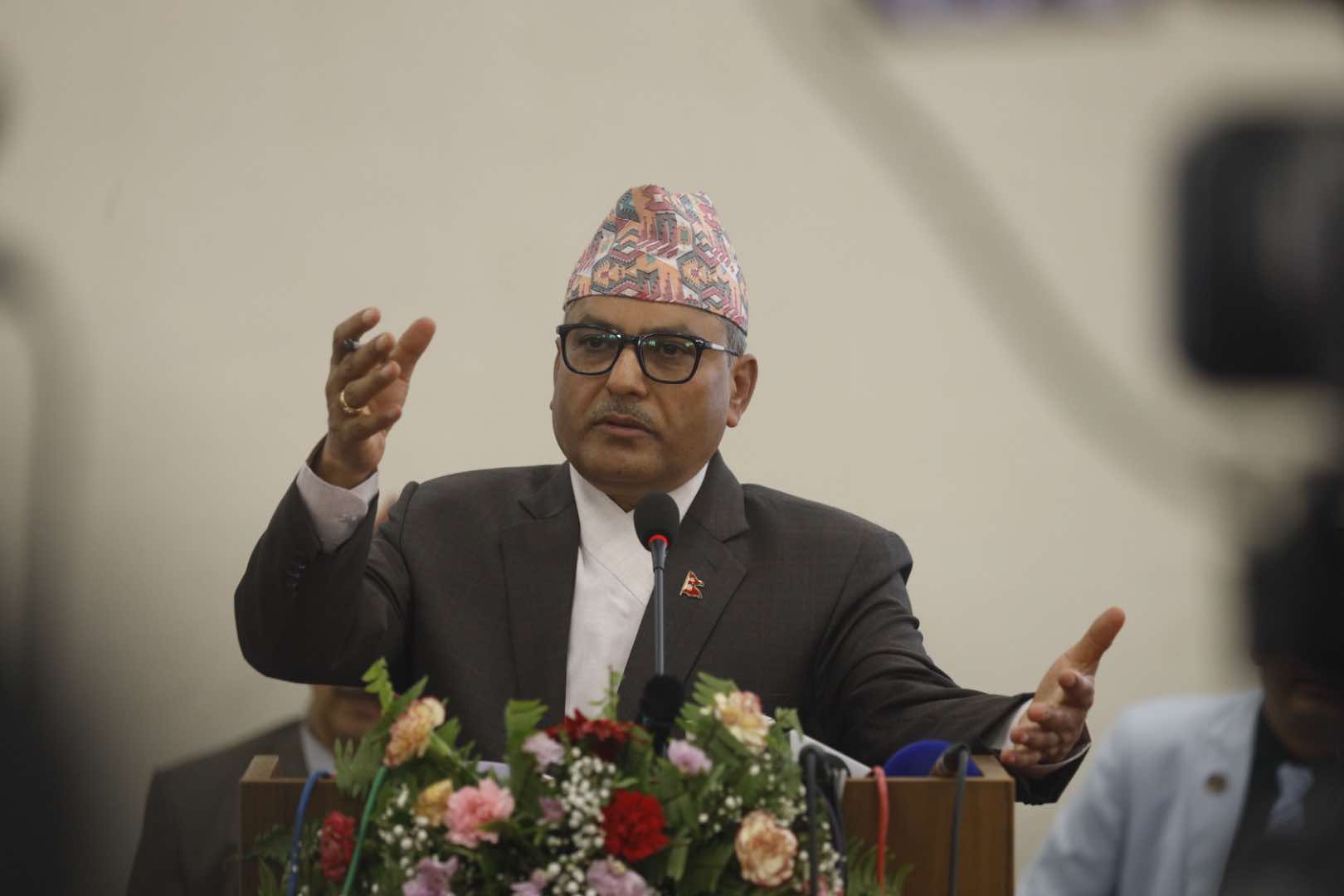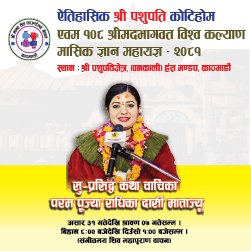Confused politics
We use Google Cloud Translation Services. Google requires we provide the following disclaimer relating to use of this service:
This service may contain translations powered by Google. Google disclaims all warranties related to the translations, expressed or implied, including any warranties of accuracy, reliability, and any implied warranties of merchantability, fitness for a particular purpose, and noninfringement.


The session of Parliament is ongoing. Opposition and ruling parties are talking in the House. Ravi Lamichhane, who was appointed as the Home Minister with the honor of Deputy Prime Minister, has seen the effect of Khagras eclipse. Should we look at this parliamentary scenario in a positive way or interpret it negatively? People are in Runbhulla.



In the current activities of the Parliament, apart from limited people in the cities and markets that are developing in various parts of the country, poor farmers, millions of young people who are fleeing abroad holding houses and land as hostages in search of employment, have not shown any interest in the current activities of the Parliament. The mind of the Nepali people is trapped in the depths of negative thoughts. People have created their own commentary – these leaders are not doing anything for us. Politics, which was considered the best of 'policies' in ancient times, has now emerged as another industry-business. Leaders of political parties are in the position of 'corporate heads'.
A very 'important' piece of news has been leaked from the midst of this parliamentary frenzy. An influential leader and MP of Nepali Congress, Shekhar Koirala, who represents Morang's Region No. 6 in Parliament, and Chairman of Nepal Communist Party (UML), Khadg Prasad Sharma Oli, held talks to make the need for a new alliance as a major agenda item instead of the current alliance. The talks have not reached any conclusion yet. That would require further discussion. For the time being, this news does not seem to have any significance. However, the Koirala-Oli talks, which achieved the status of the first and second parties in the last parliamentary elections, cannot be seen as normal.
In terms of political background, the alliance between Nepali Congress and Nepal Communist Party (unified Marxist-Leninist) does not seem natural. Both these parties were fellow travelers in the 2046 National People's Movement for the restoration of democracy in the country. After the success of the movement, both went on the path of competition. It was natural. After 2046, there was more bitterness than friendship between Congress and UML. After the death of UML's strong leader Madan Bhandari in the Dasdhunga accident, UML-Congress relations worsened. After King Gyanendra started direct rule, there was no improvement in the relationship. After the Nepali Congress took the initiative to solve the Maoist problem, the map of the constitution issued in 2047 was changed. Congress and UML went their separate ways in the new political 'set up'.
Pushpa Kamal Dahal, who was installed in the seat of the Prime Minister along with thirty-two elected MPs, had the political skills and characteristics of Prachanda. He celebrated UML President Oli on the day he played the first 'Pari' to get himself to the seat of the Prime Minister. Prachanda knew that the alliance with UML would never be easy and convenient for him. He then embarked on a campaign to elect the president on the basis of 'national consensus'. There was no way that Nepali Congress Chairman Sher Bahadur Deuba would not be satisfied with Prachanda's proposal. Because, Congress leader Ramchandra Poudel was the most 'suitable' character for this. Paudel rose to the position of honor. Congress leaders were blessed.
Congress under the leadership of Prachanda entered into an alliance with the Maoists. It was not only an alliance for the Congress, but also a part of the national consensus and reconciliation sought by BP Koirala. However, in the meeting of the Congress General Committee, the responsible leaders of the party picked up the thread of 'national consensus and reconciliation'. Congress leaders repeated the statement made before 2056 about the Maoist-led 'people's war'. Challenging secularism, Hinduism was raised. However, no Congress leader raised his voice in favor of restoring the constitutional monarchy. On the other hand, Prime Minister Prachanda was fed up with the behavior of Congress ministers. Some Congress ministers had stopped informing the Prime Minister about the important decisions of their ministries. Nepali Congress Chairman Deuba was probably not aware of these things.
joins here – Congress leader Shekhar Koirala's meeting with UML President Oli. After the Maoists broke the alliance with the Congress and forged a new relationship with the UML, the Koirala-Oli meeting has ended for now. However, politics is a game of possibilities. The question of stability in the alliance between Maoist and UML is questionable. Initially, the Prachanda-Oli alliance changed the provincial government. In Koshi, the Congress-led government formed by the efforts of Shekhar Koirala has fallen into a minority. However, the search for a meeting point between Congress and UML continues.
A junior member of Nepal's first political family, Koirala is a doctor by profession. Personally, he does not seem to have much desire to do politics. However, growing up in the courtyard of Koirala residence, it is not certain that he did not have a thirst for politics. While growing up in Koirala Niwas, which is the center of democratic culture in Nepal, he had acquired knowledge about the formulas of 'Hitopadesh' and 'Mitralav' in politics. The political culture of the Koirala residence had taken root in his mind.
Moreover, politics became a bit of a compulsion for him. The escape of BP Koirala's eldest son Prakash to the circle of Raja Gyanendra Shah, BP's younger son Shashank's growing absolutism towards politics, his brother Niranjan Koirala's distaste for politics and the failure of his uncle Girija Prasad Koirala's daughter Sujata - Shekhar not only wanted to continue the Koirala family's political legacy, but it became a compulsion. At the latest, when the Koirala estate was partitioned between the brothers, Shekhar continued the land-property belonging to him as 'Koirala estate'. It was a very important political signal.
How does Shekhar handle the evolving political situation of the country? This is an important topic. Biratnagar, the most important city in the East that blew the trumpet of democracy, and Koirala Niwas, which was its focal point, has now been decentralised. Biratnagar once influenced the entire country. That is not the case now. After the first historic people's movement replaced the independent Panchayat system, cities from Biratnagar to Rajviraj, Janakpur, Birganj, Bhairahawa and Nepalganj have developed as power centers. Power is also being extended to markets in the central and northern hills from Darchula to Taplejung. In such a situation, Koirala seeking to expand his political power is not impossible, but uncomfortable.
In spite of this, it is necessary to bring the Nepali Congress on one level to resolve the discrepancy in the center's politics. Chairman Deuba neither has ideological philosophy like BP, nor bravery like Ganeshman Singh, nor idealism like Krishnaprasad Bhattarai. However, he has brought the Nepali Congress to the present situation by using the 'original ingenuity of western Nepal'. This is his greatest achievement. However, the timing is not convenient for Koirala. Various players have emerged in Nepal's politics. These players have tried to win the hearts of the Nepali people who have reached a state of poverty due to economic, social and inconsistent politics by showing lollipops. After their presence, the parliament has been dissolved. Neither the prime minister, nor the main opposition leader, nor the Speaker, have been able to control the collapsed parliament.
In such a situation, Koirala said that it is not unusual to talk to UML President Oli and look for changes or reforms for 'political stability'. For that, a change in the electoral system has become Koirala's first prescription. It has been reported that he concluded that the development of the country will not be possible until the electoral system is improved.
The main thing is that the problems that Nepal is facing now are not due to the republican constitution, elections and so on. Federal Republic of Nepal has inherited these problems. In 2017, King Mahendra dissolved the parliament, which was undergoing progressive reforms. At that time, leaders of Congress, Communists and any other party did not engage in immoral conduct.
Raja Birendra's reformed panchayat system continued Raja Mahendra's policy by presenting it in a different vocabulary. Even the governments after the National People's Movement merely adapted the policies implemented during the independent Panchayat system. The reason why the finance ministers of the democratic system accepted the policy of the then finance minister of the panchayat system Prakash Chandra Lohani as it was was also the pressure of the international donor organizations. If the country is still in the abyss even after such radical changes, will today's politicians take the blame or not?
What was the conversation between Koirala and UML President Oli? The details have not come. However, in the changed situation, the problem will not be solved just by talking between the two. The main player now is the Maoists. Rather than how many seats he won in parliament, his presence has improved the situation or not? It is necessary to draw political conclusions.
The current government led by Prachanda has not even been able to kill Makho, apart from continuing the status quo. Depending on the season, the mobile tones sometimes sang the glory of Eid, sometimes sang the hymns of Buddha, sang the glory of Mahadev on Shivratri. Life went on regularly. The traffic police are active on the roads pretending that there is a government. Rama came to Rama and swasti Done, Ravana came and bowed his head before Ravana. It seems that the rap of the revolution in Prachanda, the commander of the people's war, is decreasing.
The Koirala-Oli dialogue is a good start. All leaders should communicate with everyone. It is not a situation where only one Congress and one UML can rule this country. The country has become a prisoner of inaction. The topics are varied, but they are all inconclusive. Leaders should understand, what is the reason for the shrinking of the government? Now it seems that the government has no news of development and progress. The entire government machinery is embroiled in corruption and malpractice scandals.
 प्रकाशित : वैशाख २, २०८१ ०७:०७
प्रकाशित : वैशाख २, २०८१ ०७:०७

 २४.१२°C काठमाडौं
२४.१२°C काठमाडौं
















